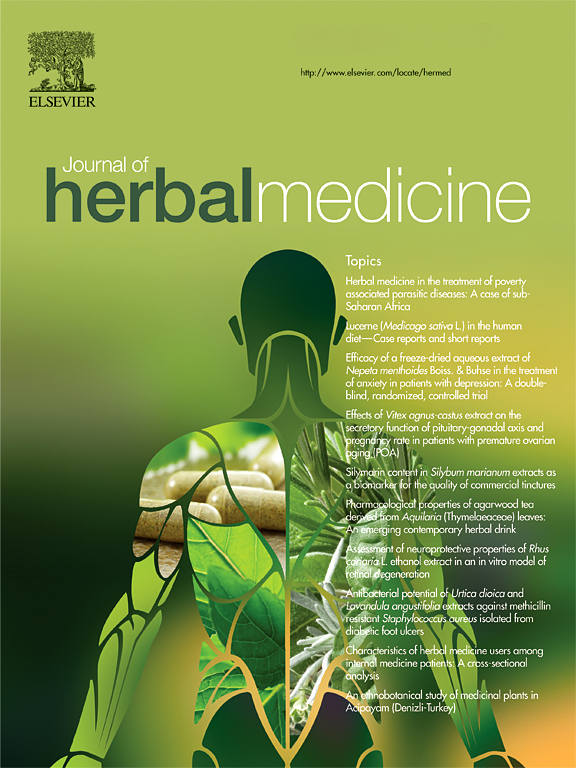The efficacy of flaxseed oil on non-alcoholic fatty liver disease: a randomised controlled trial
IF 1.9
4区 医学
Q2 INTEGRATIVE & COMPLEMENTARY MEDICINE
引用次数: 0
Abstract
Introduction
Non-Alcoholic Fatty Liver Disease (NAFLD) is a prevalent liver disorder and a leading cause of elevated liver enzymes. Previous research indicates that a diet rich in polyunsaturated fatty acids (PUFAs) can alleviate liver insulin resistance. This study investigates the therapeutic effects of flaxseed oil, a primary PUFA source, on NAFLD treatment.
Methods
In a randomized clinical trial comprising 60 NAFLD patients diagnosed with NAFLD of grades 1, 2, and 3, participants were assigned to either a flaxseed oil capsule or a placebo group, for a total duration of 2 months.
Results
Before the intervention, both groups showed no significant differences in examined parameters. However, after the intervention, the flaxseed oil group exhibited significant improvements in Aspartate Aminotransferase (AST), Alanine Aminotransferase (ALT), Alkaline Phosphatase (ALP), fasting blood sugar (FBS), and total bilirubin, compared to the placebo group. Specifically, reductions were observed in AST (P = 0.010), ALT (P = 0.047), ALP (P < 0.001), FBS (P = 0.016), and total bilirubin (P = 0.004).
Conclusions
These findings suggest that flaxseed oil may hold promise as a therapeutic intervention for NAFLD, highlighting its potential in managing liver disease and metabolic parameters.
亚麻籽油对非酒精性脂肪肝的疗效:一项随机对照试验
非酒精性脂肪性肝病(NAFLD)是一种常见的肝脏疾病,也是肝酶升高的主要原因。先前的研究表明,富含多不饱和脂肪酸(PUFAs)的饮食可以减轻肝脏胰岛素抵抗。本研究探讨了亚麻籽油(多聚脂肪酸的主要来源)对NAFLD的治疗效果。方法在一项随机临床试验中,包括60名诊断为1、2和3级NAFLD的NAFLD患者,参与者被分配到亚麻籽油胶囊组或安慰剂组,总持续时间为2个月。结果干预前,两组在检查参数上无显著差异。然而,干预后,与安慰剂组相比,亚麻籽油组在天冬氨酸转氨酶(AST)、丙氨酸转氨酶(ALT)、碱性磷酸酶(ALP)、空腹血糖(FBS)和总胆红素方面表现出显著改善。其中,AST (P = 0.010)、ALT (P = 0.047)、ALP (P <;0.001)、FBS (P = 0.016)和总胆红素(P = 0.004)。结论这些发现表明,亚麻籽油可能有望作为NAFLD的治疗干预措施,突出其在控制肝脏疾病和代谢参数方面的潜力。
本文章由计算机程序翻译,如有差异,请以英文原文为准。
求助全文
约1分钟内获得全文
求助全文
来源期刊

Journal of Herbal Medicine
INTEGRATIVE & COMPLEMENTARY MEDICINE-
CiteScore
3.90
自引率
0.00%
发文量
94
期刊介绍:
The Journal of Herbal Medicine, the official journal of the National Institute of Medical Herbalists, is a peer reviewed journal which aims to serve its readers as an authoritative resource on the profession and practice of herbal medicine. The content areas of the journal reflect the interests of Medical Herbalists and other health professionals interested in the clinical and professional application of botanical medicines. The objective is to strengthen the research and educational base of herbal medicine with research papers in the form of case studies, original research articles and reviews, monographs, clinical trials and relevant in vitro studies. It also publishes policy statements, opinion pieces, book reviews, conference proceedings and profession related information such as pharmacovigilance reports providing an information source for not only the Herbal Practitioner but any Health professional with an interest in phytotherapy.
 求助内容:
求助内容: 应助结果提醒方式:
应助结果提醒方式:


